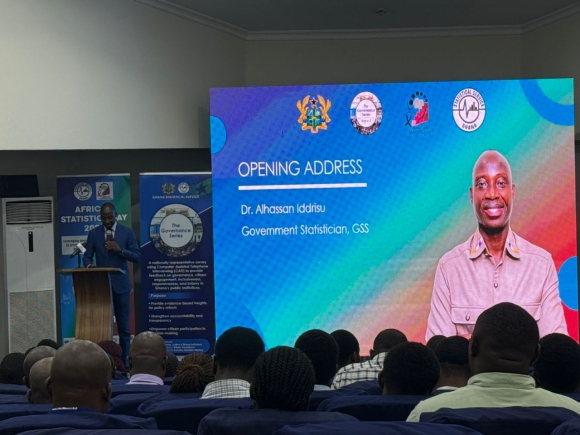
One in five Ghanaians gave money or gifts to public officials in 2025 – GSS Governance Report
The Ghana Statistical Service (GSS) has revealed that nearly one in every five Ghanaians gave money or gifts to a public official between January and June 2025, according to the latest findings from the Governance Series Wave Two Report.
The data was released today as part of the 2025 African Statistics Day commemoration, which highlighted the importance of using credible data to promote justice, peace and prosperity across the continent.
Presenting the report, the Government Statistician, Dr. Alhassan Iddrisu, underscored the need for timely governance statistics to strengthen accountable and responsive institutions.
He explained that the Governance Series was designed to integrate citizen experiences with administrative records, enabling policymakers to better monitor transparency, participation and public service delivery.
The new wave of data shows a fall in overall bribery prevalence, with 14.3 per cent of respondents reporting that they offered gifts or money to public officials, down from 18.4 per cent in the previous wave.
Although fewer people engaged in the practice, the frequency of gift-giving among those who did increased significantly. The share of respondents who gave gifts five or more times rose from 6.9 per cent to 24 per cent.
Money remained the most common form of gift, with more than half of respondents giving one hundred Ghana cedis or less. Direct requests for gifts by officials dropped from 51.3 per cent to 38.6 per cent, while voluntary gifts “in appreciation” almost doubled, moving from 17.6 per cent to 32.9 per cent. Reporting of bribery incidents through formal or informal channels also declined.
The Motor Traffic and Transport Division of the Ghana Police Service continued to be the institution most associated with gifts or bribes, although its share reduced from 61 per cent in Wave One to 51.9 per cent.
Top 10 Institutions Whose Officials Took Bribes
1. Police – Motor Traffic & Transport Division (MTTD) – 51.9%
2. Police – General Duties – 37.4%
3. Passport Office – 29.9%
4. Traffic Management Authority (City Guard) – 28.9%
5. Ghana Ports & Harbours Authority (GHAPOHA) – 28.0%
6. Births & Deaths Registry – 23.8%
7. Forestry Commission – 23.7%
8. Food & Drugs Authority (FDA) – 22.2%
9. DVLA – 20.2%
10. Police – Criminal Investigations Department (CID) – 19.9%
Beyond corruption indicators, perceptions of political inclusion improved markedly. The proportion of Ghanaians who felt they had a say in how the country is governed rose from 54.8 per cent to 68.4 per cent, while those who believed they were completely excluded fell from 42.4 per cent to 29.2 per cent.
Younger adults aged 18 to 24, older citizens above 65, and people with difficulty performing daily activities recorded some of the most significant improvements. Despite progress, the North East, Upper East and Northern regions remain the areas with the highest perceived exclusion, although all showed positive change.
The launch event brought together representatives from civil society, academia, government institutions, development partners and the media. Participants reflected on the implications of the findings and discussed ways to integrate the insights into planning, policy reform and institutional monitoring.
Bottom 10 institutions whose officials took bribe;
-
Public banks & financial institutions - 1.8%
-
Members of parliament/legislature - 1.2%
-
"Social security or welfare officials (e.g. SNIIT, Social Welfare Department, LEAP etc)" - 0.4%
-
Ghana Statistical Service - 0.2%
-
National Commission on Civic Education (NCCE) - 0.0%
-
Factory Inspectorate - 0.0%
-
Embassy/Consulate - 0.0%
-
Narcotics Control Commission - 0.0%
-
Ministry of Education - 0.0%
-
Minerals Commission - 0.0%
The Ghana Statistical Service encouraged researchers, policymakers and the public to download the full Governance Series Wave Two Report from its official website, www.statsghana.gov.gh
, and use the evidence to support efforts toward building a just, peaceful and inclusive society.
The Governance Series forms part of the GSS’ mandate under Act 1003 to produce quality data for national development. The institution continues to generate key economic and demographic statistics, including inflation, GDP, and population indicators, which serve government agencies, businesses, civil society and development partners.
